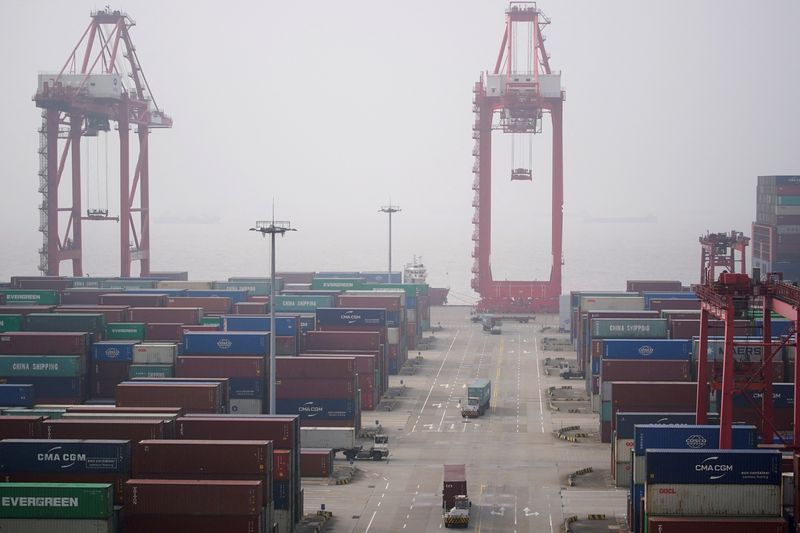By Siyi Liu and Dominique Patton
BEIJING (Reuters) -China said on Friday it will require export permits for some graphite products to protect national security, springing a surprise with another bid to control critical mineral supply in response to challenges over its global manufacturing dominance.
China is the world's top graphite producer and exporter. It also refines more than 90% of the world's graphite into the material that is used in virtually all EV battery anodes, which is the negatively charged portion of a battery.
"This bold and unexpected move by China in graphite has taken us by surprise, arriving far sooner than anyone could have predicted," said Kien Huynh, chief commercial officer at Alkemy Capital Investments, which is focused on developing projects in the energy transition metals sector.
Beijing requires the export permits at a time when many foreign governments are ratcheting up pressure on Chinese companies over their industrial practices.
The European Union is weighing levying tariffs on Chinese-made EVs, arguing they unfairly benefit from subsidies. Also, the U.S. government earlier this week widened curbs on Chinese companies' access to semiconductors, including stopping sales of more advanced artificial intelligence chips made by Nvidia (NASDAQ:NVDA).
U.S. President Joe Biden discussed critical minerals in Washington on Friday with EU officials as part of a wide-ranging set of negotiations.
China's graphite curbs are similar to those imposed since Aug. 1 for two chip-making metals, gallium and germanium. The restrictions have slashed exports of those metals recently and pushed up prices outside of the country.
The action is intensifying efforts among miners outside China to bring graphite projects to fruition while efforts to find alternatives will also be ramped up.
"What China is saying to the West with this decision is that we are not going to help you make electric cars, you have to find your own way to do that," Northern Graphite CEO Hugues Jacquemin said.
China's commerce ministry said the move on graphite was "conducive to ensuring the security and stability of the global supply chain and industrial chain, and conducive to better safeguarding national security and interests".
It added that it was not targeting any specific country. Top buyers of graphite from China include Japan, the United States, India and South Korea, according to Chinese customs data.
Under the new restrictions, China will require as of Dec. 1 that exporters apply for permits to ship two types of graphite, including high-purity, high-hardness and high-intensity synthetic graphite material, and natural flake graphite and its products.
Three types of "highly sensitive" graphite items had already been under temporary controls, the commerce ministry said, and are included in the new list.
Meanwhile, it dropped temporary controls on five less sensitive graphite items used in basic industries such as steel, metallurgy, and chemicals.
With rising sales of electric vehicles, automakers are racing to lock in supplies from outside China, but shortages are looming.
"With this new graphite export curb, South Korean firms which heavily rely on China for graphite imports would need to seek alternatives, such as mines from the United States or Australia, but it would likely increase the cost burden for many," said Kang Dong-jin, an analyst at Hyundai Motor (OTC:HYMTF) Securities.
South Korea’s trade ministry said in a statement that it had held a meeting on Friday with battery and material makers on how to respond to the export curbs.
"The South Korean government will closely communicate... to avoid production disruptions in the lithium-ion battery sector,” South Korea’s industry minister Ahn Duk-geun said.
Japan's top government spokesperson Hirokazu Matsuno said on Friday the country plans to ask China about the "operational policies" of the new measures and will "take appropriate steps" if they violate World Trading Organization rules.
Shares in China's new energy vehicle and battery makers rose after the announcement.
IMPACT UNCLEAR
Analysts said it was not clear how much impact the new measures on graphite will have in the short term.
"This control is not a complete ban, and there has been no significant impact on any industry during the previous temporary control," said Ivan Lam, a senior analyst at Counterpoint Research.
Prices for natural flake graphite were 3,950 yuan ($539.62) a metric ton this week, down 25.5% from the beginning of this year because of declining demand from the EV sector, according to consultancy Mysteel.
"This action could set them on an upward trajectory internationally, while keeping domestic prices low for Chinese battery producers," said Tom Kavanagh, head of battery metals at commodity and energy pricing agency Argus.
Still, exports are likely to rise ahead of Dec. 1, said Echo Ma, an analyst at Rystad Energy, especially to countries with established battery industries like Japan, South Korea and the United States.
China has reduced natural graphite mining in recent years to protect the environment, instead ramping up synthetic graphite output since 2021. The synthetic form - which is produced using a byproduct of the oil refining process - now accounts for 70% of China's output, according to Mysteel.
U.S. miners said China's move underscores the need for Washington to ease its own permit review process. Nearly one-third of the graphite consumed in the United States comes from China, according to the Alliance for Automotive Innovation, which represents auto supply chain companies.

"It's well past time for the U.S. to lean into our vast mineral resources and build the secure, responsible mineral supply chains we so urgently need," said Rich Nolan, head of the National Mining Association trade group.
($1 = 7.3200 Chinese yuan renminbi)